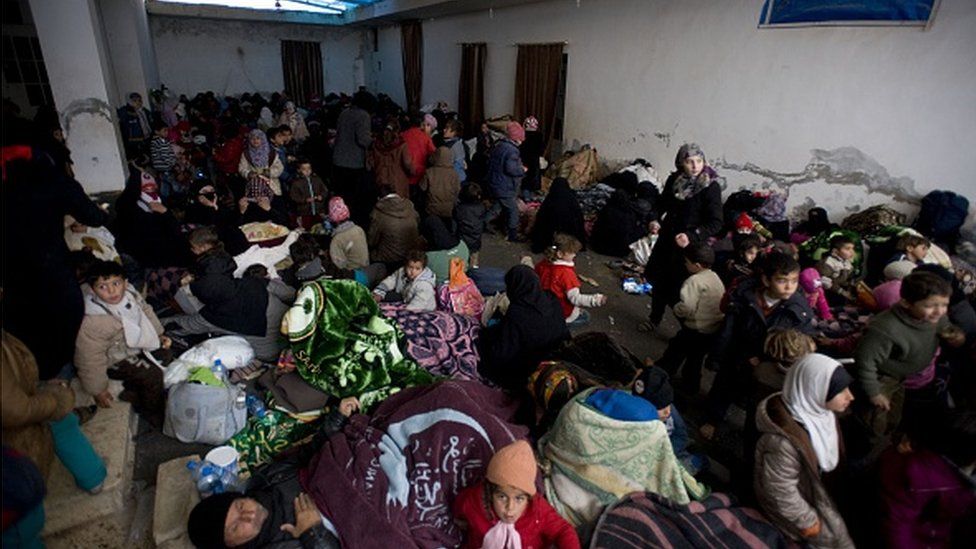Turkey uses refugee crisis to up the ante
- Published

Consider for a moment these two statements, both by European commissioners, a day apart.
First, from EU foreign policy chief Federica Mogherini: "Turkey has a moral if not a legal duty to provide protection to those fleeing persecution."
Then, Johannes Hahn, the EU's enlargement commissioner: "The action plan with Turkey was agreed more than two months ago, and we're still not seeing a significant decline in the number of migrants. Turkey could do more."
What it boils down to is this: open the back door to let in the refugees, but close the front one to stop them moving on.
That is the bind Turkey is now in: caught between the humanitarian crisis in Syria and the refugee crisis in Europe.
At its southern border with Syria, tens of thousands are waiting to cross, Turkey still the gatekeeper to sanctuary.
But at its western border with Greece, the EU is demanding more patrols to stop them from continuing their journey - to stem Europe's most serious migration crisis since World War Two.
And so amid conflicting pressures, the Kilis border crossing between Turkey and Syria remains shut, those escaping the nightmare of Aleppo stuck in the middle of a bigger and more complicated debate.
Bargaining chip
The EU says the 3bn euros (£2.3bn) it is giving Turkey as part of a recent deal is precisely aimed at allowing the country to cope with its refugee influx and welcome in more like those from Aleppo.
Ankara retorts it needs that money to help the 2.5 million Syrians already here, improving their living conditions to allow them to stay.
Providing them with access to education and the workforce will eat into the EU money.
If the 3bn euros is spent on new refugee camps for tens of thousands fleeing Aleppo, it could run out fast.
But it's not just Europe playing politics with the Aleppo crisis.
Turkey is undoubtedly using this situation as a bargaining chip, hoping to get more money and help from Europe as well as concrete action to halt the Russian air strikes, which have pushed so many to flee.
Turkey is dangling the keys to its border in front of the nose of Brussels. The message: "Help us, or we'll set this group loose on you."
Moreover, by establishing refugee camps on the Syrian side of the border, Turkey is presenting a blueprint of its long-stated goal: to create a "safe zone" in northern Syria in which refugees can be sheltered, patrolled by the international community.
Critics say Ankara wants that only to prevent Syrian Kurdish groups - Turkey's enemy - from cementing their control of the area.
Either way, with Turkish aid camps already housing thousands who have escaped Aleppo, the buffer zone is moving from idea to reality.
That this point has been reached is undoubtedly an indictment of Western inaction during five years of the Syrian war - and a lack of co-ordination by Europe over the refugee crisis.
And the prospects for resolution look bleak. EU countries are still fighting over the numbers of refugees they will absorb, the onslaught on Aleppo is intensifying and Syrian peace talks in Geneva collapsed last week into a mess of acrimony.
What is more, many EU members are reluctant to cosy up to a Turkish government that is jailing journalists, suing perceived critics and waging an armed conflict with its Kurdish minority.
And so politics fails, the war drags on - and 350,000 residents of Aleppo could be surrounded if the assault by the Syrian government and Russian air strikes achieve their goal.
That could deal a fatal blow to the Syrian opposition - and send tens of thousands more fleeing towards the Turkish border.
Perhaps those mixed messages from Europe simply reveal the stark reality: nobody knows how Syria's hell can end.
The Syrian war and Aleppo
March 2011: Anti-government protests erupt across Syria, but Aleppo is initially untouched as a result of a state crackdown
February 2012: As the rebellion turns into a conflict, clashes between rebels and the government are reported with increasing frequency in Aleppo province
July 2012: The battle for Aleppo begins. Rebels make swift advances, but are unable to consolidate their gains and the city becomes divided
2013: The government begins bombarding rebel districts with barrel bombs, causing thousands of casualties
September 2015: Syria launches a fresh offensive in the wake of Russia's intervention in the conflict
February 2016: The government captures towns north of Aleppo, threatening to encircle the city
- Published8 February 2016
- Published15 January 2016